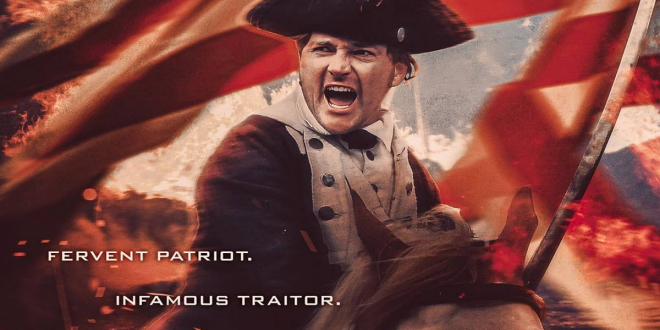Benedict Arnold: Hero Betrayed is a highly controversial, and historically-driven documentary that challenges the American establishment and repositions one of this country’s revolutionary superstars, Benedict Arnold, as a hero, not a traitor.
Benedict Arnold: Hero Betrayed narrated by Martin Sheen, rejects the long-standing narrative that Benedict Arnold was the greatest traitor of the revolution and places him alongside the heroes of this nation’s early years.
Shining a light on the Revolution like never before, Benedict Arnold: Hero Betrayed confronts the myths surrounding Benedict Arnold and reaffirms that history is never black and white and always memorialized by the victors. Arnold’s contributions to America have been largely forgotten, although they are second in importance to only George Washington. At a time when statues are being torn down and cancel culture is redefining heroes and traitors, this film could not be more relevant. “Benedict Arnold has always been seen as a cartoon villain,” says director Chris Stearns. “To really understand him as a person, we needed to see what he was struggling to overcome. I hope viewers will come to appreciate his very personal story as well as the large-scale story of the great sacrifice and effort he and others gave to the cause of liberty.” Legacy Distribution is proud to debut Benedict Arnold: Hero Betrayed it will premiere on TVOD/EST including iTunes and Amazon on November 9. 2021.
Chris, what led you to the Benedict Arnold story?
The producers Anthony Vertucci and Tom Mercer and I all grew up in upstate New York. We all heard stories about Benedict Arnold’s heroics in our backyards. This is the region where the whole Northern Campaign of the American Revolution was fought. When the three of us discovered our mutual interest, we decided to look deeper into the Arnold story. We came across James Kirby Martin’s book “Benedict Arnold Revolutionary Hero An American Warrior Reconsidered“. Jim Martin joined us in creating this overlooked story about the founding of our nation.
We live in a time when the myths of our founders are being laid bare. We see statues of slave holding leaders of the revolution as well as statues of leaders of the confederacy ripped from their pedestals. Our country is struggling with who we see as heroes and who we see as villains. We should take a moment to re-evaluate the man whose name is synonymous with the word Traitor and appreciate what he actually accomplished.
“To really understand Benedict Arnold as a person, we need to see what he was struggling to overcome.” Explain.
Arnold saw corruption, cronyism and arbitrary power threatening his fellow countryman and him personally. His sense of fair play led him first to fight the British Empire and later to turn against the rebellion. Myths of his motives being greed, lust for power and an oversized ego do not ring true when you understand Arnold as a person.
Your documentary was treated more like a feature film. Tell us why this was important.
The story of Arnold demanded that we use the visual medium of film for all it could give. We wanted to bring history to life by recreating huge battle scenes with thousands of extras and naval battles with real ships. Simply showing old paintings and silent cannons on grassy fields would never be enough to convey a story like this.
You filmed in-depth interviews with a dozen historians and other knowledgeable sources. What stood out to you?
The historians we interviewed have published amazing work. On camera they became exciting storytellers. I think most Americans only know the fairy tales told to us about Benedict Arnold and for that matter about the Revolution itself. I found myself guilty of this too. But for historians the truth about Benedict Arnold is in plain sight once you start to look.
Did Benedict Arnold’s contributions to the American cause far outweigh his damage?
All of his contributions as an American commander had a major impact on winning our independence. Everything he did once he returned to the crown had practically zero impact. Ironically, Arnold’s turn actually stiffened American resolve to fight on.
How did the creative decision turn out to be a tremendous undertaking?
It was go big or don’t waste your time trying to tell this story. The need to tell the story in such a dramatic cinematic way would really strain our limited resources. There are no corporate sponsors lining up to tell the story of America’s most infamous trader. So fund raising was very hard and time consuming. My two main partners and I ended up having to do a lot of the work by ourselves.
Did you feel like you were in a time machine?
Many times, I felt like I was in a time machine. Peter O’Meara as General Arnold and David Bunce as General Gates recreated a confrontation between the two commanders. They had no script. These two great actors just went at it. I thought I was in the actual tent back in 1777. I didn’t want to yell “cut.” And then filming in the midst of a massive re-enactment of the Battle of Saratoga was like being a war correspondent transported back to 1777.
Why did the most fervent Patriot of the Revolution turn his back on the cause he fought for and nearly died for. Was Benedict Arnold a hero?
Arnold turned his back on the revolution because he believed the cause had turned its back on him and the ideals he had been fighting for. I think our film shows Arnold’s bravery, leadership and passion and the audience will conclude that he is a real hero who had a great impact on our struggle for independence.

